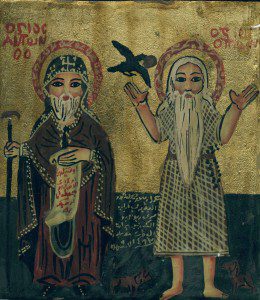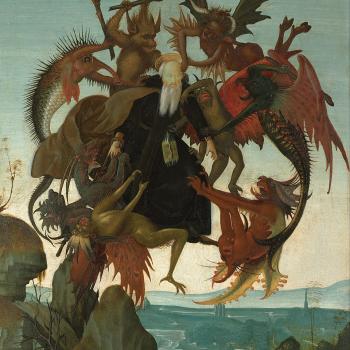
Humanity, like the rest of creation, is naturally good. God saw all things and saw they were good (cf. Gen. 1:31). Though, we often say, when we fail to live up to our potential, that it is due to something in our nature, in truth, it is not human nature which is bad, but rather, our failing is personal. That is, when we go astray, we do so as persons, persons who abuse or subvert the goodness of our nature for some immoral end. We corrupt ourselves through our personal actions. It is as persons that we find ourselves diverting away from our natural goodness, and so it is as persons we find ourselves becoming, as it were, sub-natural when we do some sort of evil and help sin come into the world. We squander the potentiality given to us by our nature, and when we do so, we transform ourselves, so that we lose the abilities and potentialities which we once had. The only way we can return to and embrace our natural goodness and the potential it gave us is for us to be healed from our own self-inflicted wounds. This is what God, with love and grace, provides to us. We need to take it in and embrace it, letting it integrate itself in our lives. The more we do so, the more we will find it will help lift us up out of the mess we made for ourselves, as we slowly find ourselves returning to our original, integral good. But then, as we embrace grace as persons, and as grace itself comes from God, that grace allows us to become something greater, some better, than what we could be by nature. It allows us, that is, to continue to grow, the more we embrace it, so we go from being sub-natural to a state and condition which can be said to be supra-natural, and it is in this way we can even be said to become “gods.”
Natural human goodness is such that one who embraces it will not hurt others, or themselves, for they will act without sinning, and cause no one any harm. It is good, but there is more which is possible, a greater good which can be done, than merely not doing anyone any harm, for we can act to positively help others. And, when we find ourselves elevated beyond our nature, to become, as it were supra-natural, that is what we will be doing, for the more we embrace that supra-natural goodness, the more like God we will become. God is love, and acts in and through that love. Love is self-giving, even sacrificial, as the lover will act selflessly to lift up their beloved. Thus, the more we become like God, the more we will act out of such self-giving love, engaging others through it, meaning, we will engage others with a spirit to make things better for them without considering the implications for ourselves. While suffering is an evil, nonetheless, one who loves is even willing to suffer for the sake of their beloved, and the more they do so, however paradoxical it might seem, the greater they become. The one who has been taken in by grace, therefore, is one who will be self-giving in love, willing to forgive others, even as God, out of love, shows love, not anger or spirit or malice towards us despite all our sins. God reveals this to us in and through the incarnation, in and through Jesus, where we see the greatness of God’s love for us: even when we were sinners, Jesus died for us, forgiving us our every trespass. A desert father, possibly St. Antony the Great, expressed this point by saying:
He [Antony?] also said: “He who is gratuitously done an injustice and forgives his neighbour is of the nature of Jesus. He who neither commits nor suffers an injustice is of the nature of Adam. He who commits injustice or demands interest or wickedly conspires is of the demon’s nature.” [1]
We were made good, but we failed to live out that natural goodness; we can, with grace, find ourselves returning to our own natural good, to be like “Adam,” free from all suffering, as we will be free from those sins which cause such suffering. Nonetheless, such goodness is merely a particular, indeed, a relatively low level of goodness. It is good, because it does not embrace sin, but it does not know the perfection of goodness, the perfection which can only be known in and through love. Love helps us transcend ourselves, which is why it can and will help us as persons to become something greater than we are by nature. To be sure, becoming supra-natural in this way must not be understood as denigrating or losing the good which we have by nature, but rather, it should be seen as building upon it. Our natural good will remain with us as a kind of base by which we, as persons, build ourselves, as we take in grace and become supra-natural. Sin, on the other hand, chips away at that base, destroying that goodness, so that as persons, we become sub-natural, and in this way, we can be said to become like demons, because we will have fallen from our own natural goodness into a state which causes us constant pain and suffering. It is a state, once we have fallen into it, we cannot get out of it by ourselves; more often than not, then, our response to our new state is to struggle, but that struggle has us embrace more evil, making us less and less like our natural good, turning whatever love we might have in us into malice. We end up seeking to harm others, to cause they pain and suffering, as a way to deal with our pain. The more we act in such cruelty, the more we ignore the goodness of creation and do not care to preserve it but selfishly use it and exploit it, the more we become, as it were, like demons, and our minds, therefore, can be said to become filled with demonic thoughts and intentions. But, as our nature, however wounded it is, remains, there always is some good for God to use, some good by which we can receive grace and through that grace, find ourselves restored to the good which we lost. Then, we can continue and develop as God intended us to, to embrace grace with love, and through that love, become like God. Then, like God, when we encounter others causing us pain, our response will not be of malice, but of love:
For the graciousness and love of God, which he always shows to the human race and which is never extinguished by hurt, such that it would lose concern for our salvation and withdraw from his original intention as if overcome by our wickedness, could not be expressed by a better comparison than the example of a man who is passionately in love with a woman and who is all the more vehemently inflamed with desire for her the more he feels that he is neglected and despised by her. [2]
We, then, should love, and in loving, grow beyond our initial goodness and truly take on the way of God. It is not easy. It is the way of the cross, and the way of the cross is not easy. It will be riddled with pain and sorrow, but in the end, it is the way of greatness, as we will find that such love cannot and will not perish but only grow stronger, bringing with it greater joy and happiness even as Jesus died but then rose in glory.
[1] John Wortley, trans., The Anonymous Sayings Of The Desert Fathers: A Select Edition And Complete English Translation (Cambridge: Cambridge University Press, 2013), 621 [N 760]. The previous passage referred to a saying of St. Antony, which is why it appears this is also one of his sayings.
[2] John Cassian, The Conferences. Trans. Boniface Ramsey, OP (New York: Newman Press, 1997), 473-4 [Thirteenth Conference; Chaeremon].
Stay in touch! Like A Little Bit of Nothing on Facebook.
If you liked what you read, please consider sharing it with your friends and family!
N.B.: While I read comments to moderate them, I rarely respond to them. If I don’t respond to your comment directly, don’t assume I am unthankful for it. I appreciate it. But I want readers to feel free to ask questions, and hopefully, dialogue with each other. I have shared what I wanted to say, though some responses will get a brief reply by me, or, if I find it interesting and something I can engage fully, as the foundation for another post. I have had many posts inspired or improved upon thanks to my readers.













